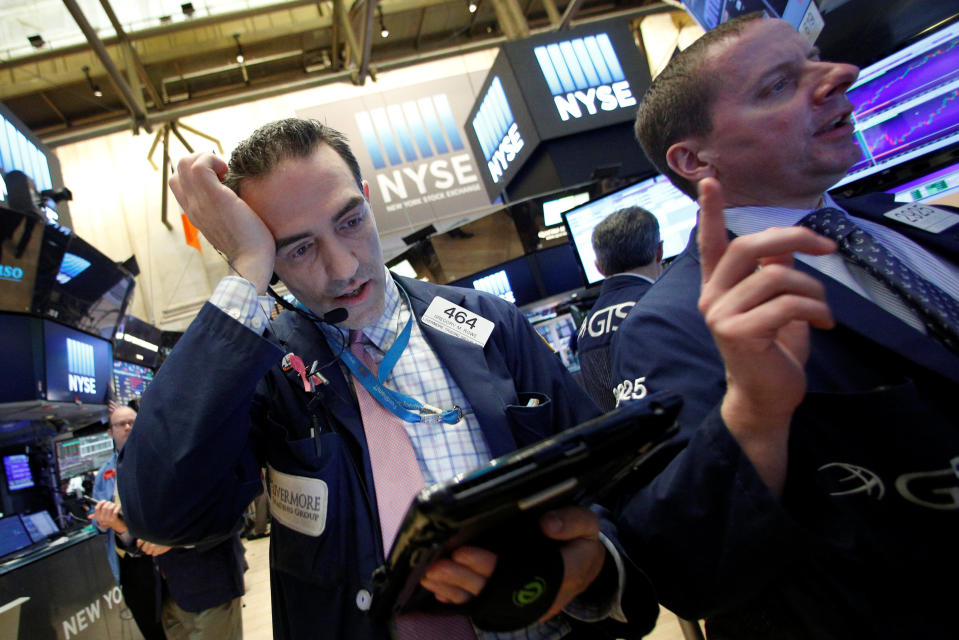Trump gets sworn in — What you need to know in markets this week
The wait is over.
On Friday, President-elect Donald Trump will be the President-elect no more.
The week’s main event in markets, while seeming perhaps a bit tangential to markets, will be the inauguration, set for noon eastern on Friday in Washington, D.C.
The economic calendar this week will be light, as the main data highlight will be Wednesday’s monthly inflation report.
In markets, expect discussion around Dow 20,000 to continue because, well, the Dow still hasn’t crossed the threshold which is more psychological than anything else. On the corporate front, earnings results will begin to roll in with Netflix (NFLX) and Goldman Sachs (GS) reporting on Wednesday while General Electric (GE) will issue results on Friday.
The World Economic Forum in Davos, Switzerland will also get underway, providing a poetic backdrop for the Trump inauguration considering that this annual gathering of the world’s political and business elite stand for the establishment that Trump so vociferously ran against.

Economic Calendar
Monday: Markets closed for Martin Luther King, Jr. holiday.
Tuesday: New York Fed Empire State Manufacturing (8.4 expected; 9.0 previously)
Wednesday: Consumer price index, December (+0.3% month-on-month expected; +0.2% month-on-month expected; +2.2% year-on-year expected; +2.1% year-on-year previously); Industrial production, December (+0.6% expected; -0.4% previously); Homebuilder sentiment, January (69 expected; 70 previously)
Thursday: Housing starts, December (+9.2% expected; -18.7% previously); Initial jobless claims (252,000 expected; 247,000 previously); Philly Fed manufacturing (16.0 expected; 21.5 previously)
Friday: Donald Trump sworn in as US President (Barack Obama previously)
Short-Term, Long-Term
Any active investor is, by definition, seeking an edge.
So here’s a headline: 60% of millennials surveyed by E-Trade said they’d traded off of a tweet from Donald Trump. These results came from a survey of 904 people with at least $10,000 in an E-Trade account and who had traded between January 1 and January 10. The millennials were account holders between 25-34 years old.
On the one hand, this seems crazy. Trading off a tweet from the President-elect is not the path to long-term investing success. Those who responded to this survey, however, likely see themselves as more sophisticated than the average investor (read: active), and therefore think they can either 1) better execute trades based on tweets or 2) work around losses incurred as a result of these trades.

Additionally, E-Trade’s business model is largely predicated on charging commissions for trade executed via its platform. Certainly, the PR from becoming the “platform of choice for Trump traders” or something similarly vapid might not be great in the long run, but that isn’t quite what’s happening here — E-Trade customers are using E-Trade’s platform to trade.
Long-term investors saving for retirement using, in part, the stock market should not trade off Trump tweet. That, however, doesn’t appear to be happening here.
If you’re an active investor looking for an edge, then a strategy that might even worse than trading off tweets is simply waiting for the market to correct and then buying the dip. Especially because it seems that this is what everyone else wants to do, too.
“Given that the market has been on a torrid run over the past several months (particularly since the election), an increasing number of investors are convinced that stocks are on the verge of a meaningful correction based on our client conversations,” writes Brian Belski, chief investment strategist at BMO Capital Markets.
“However, many of these same clients also do not expect any sort of prolonged bear market to ensue and instead are biding their time in hopes that this anticipated market pullback will present better buying opportunities – particularly when the likelihood of Trump’s policy proposals being enacted becomes clearer.”
So… many clients think they are going to be the ones to identify, and then capitalize, on a short-term market correct but also think they won’t find themselves caught up in a market that begins a long-term downtrend?
That is not how markets really work! And Belski and his team are not buying this strategy.

“Quite frankly, we believe this approach is a mistake and also believe all the catchy ‘buy the election and sell the inauguration’ chatter is nonsense,” Belski writes.
“In fact, we do not envision a scenario that takes stock prices meaningfully lower from current levels. Everything we track continues to suggest that we are in the midst of a secular bull cycle.”
Earlier this year, Belski told Yahoo Finance the next leg of the bull market is likely to be driven by an improvement in earnings — rather than an increase in the valuation of stocks — and when earnings are driving stock prices, things can get bumpy.
In a volatile market, then, active investors could have opportunities to capitalize from short-term declines. Alternatively, investors could have the chance to capitalize off of tweets that temporarily move certain stocks.
But both E-Trade’s survey and Belski’s commentary indicate that if you want to beat the market, trying not to be like everyone else might be the hardest part. Aside from, you know, actually beating the market.
—
Myles Udland is a writer at Yahoo Finance. Follow him on Twitter @MylesUdland
Read more from Myles:

 Yahoo Finance
Yahoo Finance 
